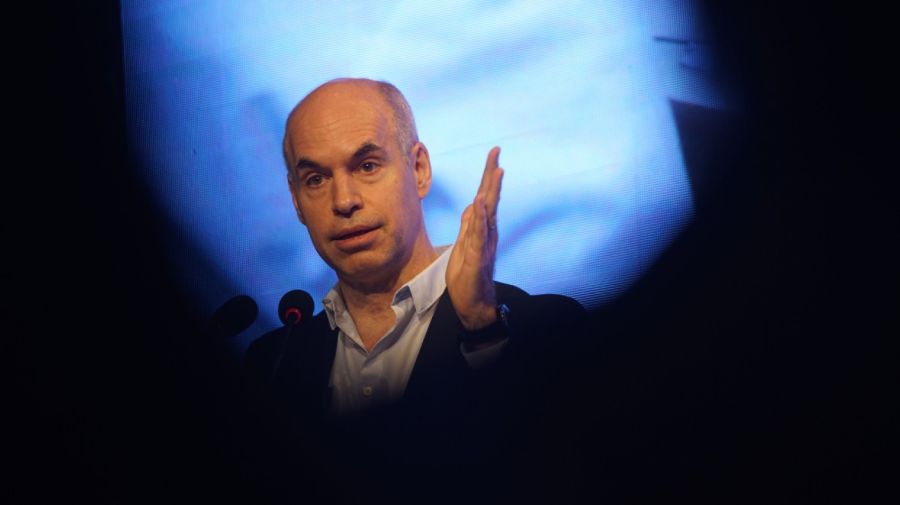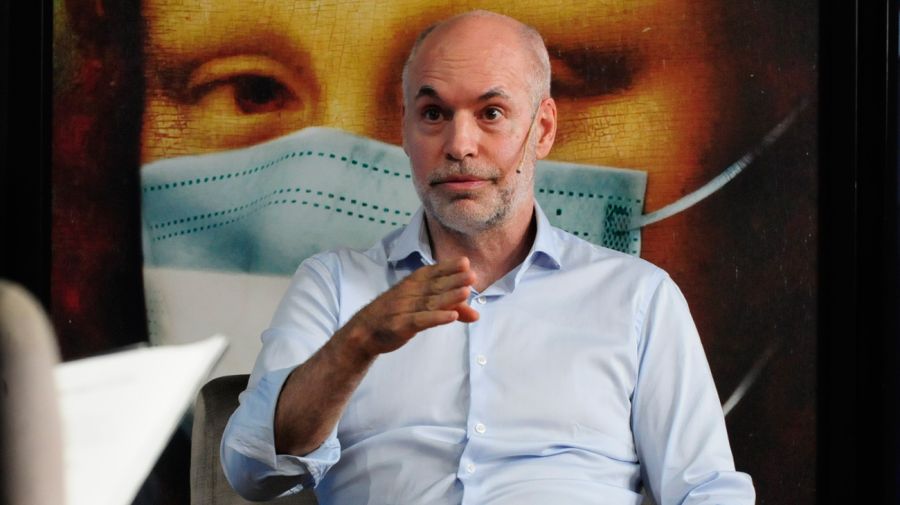Amid tensions between City Hall and the national government over the Supreme Court’s federal revenue-sharing ruling, Horacio Rodríguez Larreta is ready to stand his ground.
In a feature interview, the Juntos por el Cambio 2023 presidential hopeful runs through last year’s most relevant political developments and analyses his possible rivals in the primaries, making clear his preference for PRO candidates.
President Alberto Fernández has announced that he would be partially heeding the Supreme Court ruling, tweeting that he has instructed the economy minister to send to the extraordinary sessions of Congress a bill providing the necessary budgetary funds to comply with the court order, in accordance with Article 22 of Law 23,982, which establishes that the payment of a debt may be required once the ordinary period [of Congress] has concluded where the budgetary adjustment is to be resolved. Have you made any evaluation of what that might mean and the intentions lying behind it?
Yes, they’re just gimmicks, trickery in reality. Supreme Court rulings are to be heeded, not partially or interpretatively, “it seems to me...” but simply carried out. The Supreme Court ruling is crystal-clear. What the government has to do is to increase the City’s federal revenue-sharing allocation in detriment of the national share and what I’m saying here is very important – this does not affect any province, and furthermore, as the ruling explicitly says, there is not a single peso now heading to the provinces which will stop going. In the same way that when in 2020 the president slashed Buenos Aires City’s federal revenue-sharing allocation, not a single peso was given to the provinces. It all went to Buenos Aires Province, inland provinces were not given a single peso. In the same way but now in reverse, the return of those funds does not imply a single peso for the provinces. That’s why I found it hard to understand what those governors backing this measure are doing. If you think it through, it is a very federal measure because it creates a precedent for the national government never again being able to take away federal revenue-sharing money from the provinces arbitrarily.
I’m smiling because in reality it seems very clear that by making this an issue between unitarians and federalists, they are finding an electioneering element to hurt you as a presidential candidate among many inland voters.
Yes, this is indeed a discussion between unitarians and federalists, between a very strong national government and all the districts, including the Federal Capital. This is not a conflict between the Capital and the hinterland. The argument between the Capital and the hinterland was settled in 1880, more or less 140 years ago.
But evidently it permits several Peronist governors to play up that ancient idea of the argument between unitarians and federalists, thus harming you from an electoral viewpoint, or rather they seek to harm you as a presidential candidate but to benefit you as a hopeful because obviously, placing you in centre stage makes the PASO primaries easier for you and then they will seek to hurt you later in the general elections.
People understand, I would say clearly, that the president has not given a single peso to any province. If we have a unitarian government today, that is because Kirchnerism has governed for 16 of the last 20 years and transformed Argentina into the most centralist stage of its history. That is not an opinion speaking, those are the numbers. If you take the percentage of total reserves collected by the state at every level, the national government’s share was never so high. That is a unitarian government. Today a governor who wants to build 20 housing starts or, I don’t know, 10 kilometres of highway has to go knocking on national government doors and deal with bureaucrats who have often never even been to their provinces. Today we are more unitarian than ever. That must be reversed, Argentina must become a federal country again and this ruling is somehow a step towards being a federal country because the national government will never be able to touch a peso of the provinces again.
What do you think about the conflict around the assassination attempt against the Vice-President [Cristina Fernández de Kirchner], the fencing afterwards removed by the City Police, did that create the conditions for the attempt?
The vice-president and all other national officials are guarded by the Federal Police, that is beyond any argument. But apart from that there was a ruling that same week, a few days beforehand, by the magistrate [Roberto] Gallardo asking the City Police to abstain from participation in that zone. That in case there are any doubts.
What I do consider important is that we lost a grand opportunity to appeal to unity in Argentina. We would have been all together. I came out repudiating it the moment I heard about it. An assassination attempt against a vice-president is such a grave situation that it was the moment to give a message of unity. Now that same night within a few hours the president launched his message of blaming the opposition and the media, among others, looking for culprits left, right and centre. Both we and they were summoning those who supported us to a square and a week later we ended up with a politicised mass, we lost an opportunity. There are many countries where situations like that have helped unity and we would have been all together.
Does the link between members of the Revolución Federal grouping and the company of one of the members of the Caputo family bother you?
No, no way, there is no basis there. It concerned some furniture, it had nothing to do with it, I’m convinced of that.
The trip to Lago Escondido with judges and prosecutors also included Marcelo D’Alessandro, your [City government] security minister. Do you think he made a mistake in going?
It was a private trip, it had nothing to do with his post as City security minister. Of course, Marcelo and all of us in the City of Buenos Aires are at the court’s disposal to investigate if there was a crime of any type, which I do not see, but the trip was totally private and nothing to do with his job.
A person is always private but there is a public function.
One makes trips representing the government but that was not the case here. It was a private trip.
So you don’t see it as serious?
It was a private trip.
Don’t you see it as serious, for example, that judges like [Julián] Ercolini...?
I understand that many of them have been friends for many years.
Does it not seem serious to you that the same judge sending the Vialidad highway contracts case involving Cristina Fernández de Kirchner to trial should travel together with officials paid by a private company? Does that not give you a feeling that something is not working right?
In both the cases of City Hall officials, they paid for their trips and they have the invoices, both D’Alessandro and [City Attorney-General Juan Bautista] Mahiques. Both have shown that they paid for their trips.
So that the chats disclosed do not seem credible to you?
First and foremost, the most serious thing in Argentina today is that there is espionage on private chats. That is the most serious. Afterwards we can discuss whether the contents thus verified are true or not. They say some things were edited. The truth is I don’t know what is and isn’t true.
From there it would seem to emerge that they did not actually pay but made it seem as if they did so that may leave you with the suspicion that what your officials tell you might not be so. Perhaps they subsequently tried to pay for something for which they had not paid beforehand. Obviously, if they really did pay for the trip previously, we are talking about something else.
The suspicion ends when they show the invoice with the corresponding date and everything indicates that they paid for the trip. I don’t know if the chat, obtained by totally illegal means, was edited or not. They say that some parts were and others not. The truth is that I don’t know but the invoices are there.
Would you place your hands in the fire for D’Alessandro? [Ed. this interview preceded disclosure of new D’Alessandro chats showing him exchanging information with the right-hand man of Supreme Court Chief Justice Horacio Rosatti and prior to the official requesting a leave of absence from his post].
All that is really up to the courts.
But doesn’t it seem serious to you anyway that, even paying for the trip, judges should travel with businessmen?
I have friends who are businessmen and friends with various roles in society, relationships going back many years, I don’t know how long I have known them. What I do know is that this trip had nothing to do with his function as a City minister.
Referring to the judges, would you feel comfortable, were you to become president of the Republic, seeing judges who send relevant cases to trial, travelling with businessmen?
I’ve now been working for 15 years at the helm of City Hall, seven of them as Mayor. If I go to a restaurant and appeals court judges – not City magistrates – are sitting at another table, I do not know them. I’m very extreme about that. I know the Supreme Court because once a year they invite me to lunch as an entirely protocol event.
So what I’m telling you is an opinion.
I’m telling you how I operate. I’m an extremist at keeping my distance but in my case I head a government, I represent its executive branch, not its judicial. There must be a separation of powers there.

Last October Frente de Todos legislator Claudio Morresi denounced your use of City funds for your presidential candidacy via the creation of a programme of sporting clinics in other jurisdictions. What would your response be to that?
The truth is that I was not aware of those charges in particular. I have no problem with the courts investigating anything, I’ve governed the City for many years and never, ever have had a corruption case. And so that the courts can investigate everything, all City spending is neatly presented in the City web. We have a level of total transparency for everybody with any doubts.
There was a controversial issue back in July. Following a press investigation, it became known that the licences of the two companies running the famous cranes towing away badly parked cars were out of date with the auditor-general of the City of Buenos Aires verifying that the cranes netted the monthly licence fee of 55,000 pesos within half an hour while the City had not taken charge of the haulage for almost six months. Why did that happen?
This is a service which was contracted three or four administrations ago. There were at least three initiatives, and I believe a fourth, for a new tender, approved each time by the City Legislature and overturned in court due to a lawsuit presented by one or other of those two companies, clearly to their benefit. We set a limit to that some months ago, saying that if a new tender could not be adjudicated, we would open up the zones to divide the City into more areas in order to have more participants and not just those two. And the tender is moving ahead. But in order not to keep stretching this out forever, which is what suits those now providing the service, we took it away from them by placing the state in charge so that they no longer had the motivation to keep kicking the ball ahead. The prices of the service come from the original contract, updated for the inflation since then.
Did this contract come from the times of the Alliance?
To be honest, I think it comes from the [Aníbal] Ibarra mayoralty, prior to Mauricio [Macri], who was preceded by [Jorge] Telerman.
As for the new officials joining City Hall, does the recruitment of Waldo Wolff and Cynthia Hotton mark a shift to the right?
No, not at all. Cynthia Hotton previously represented Buenos Aires Province with a diplomatic career on which she worked very hard. Waldo Wolff is one of our main spokesmen in Congress. I’ve long had a personal relationship with him and wanted to get him into City Hall and finally we ended up convincing him. You wouldn’t call Martín Redrado a right-wing economist.
I was referring to those two people. [Silvia] Lospennato to balance Cynthia Hotton in one sense, Redrado to...
Even if for me placing people left or right is a simplification, when you take the four of them, it’s more or less balanced.
So the idea is to balance.
No, that’s not how I make my decisions, I decide on the basis of their capabilities, which obviously each one of them has. Martín Redrado has been one of Argentina’s most prestigious economists for many years. Silvia Lospennato is thought of highly.
How do you see the economy this year and how do you imagine it evolving towards the elections?
I see it with very great concern. We ended up 2022 with almost 100 percent annual inflation, above all projecting the second half annually. I do not see any clear government plan to lower inflation. A loaf of bread at 500 pesos in the supermarket, milk 230 to 250 pesos in some places, it drives you to despair.
With general inflation on either side of five percent in the past couple of months and food three and a bit in November, do you suppose that there exists any possibility of Economy Minister Sergio Massa reaching autumn with three percent monthly inflation?
Today I see no plan to lower inflation. We’ve had a month with lower inflation and we’ve had months with higher. You have to see if a trend consolidates after three or four months. I hope for the sake of all Argentines that this government begins to control inflation. I don’t see a plan and this requires an integral plan. Look at how exchange rates have been on the move in recent days.
An integral plan would genuinely lower inflation but I’m referring to...
No, an integral plan is much more than that. An integral plan would be for Argentina to produce more, sell more, export more.
I’m referring, although it may be part of something bigger, that when you talk of lowering inflation, I understand you to be referring to reducing it to single-digit annual levels, as in most countries around the world. Do you believe it to be a possible scenario that this plan – and I’m not saying that it will – manages to lower it to an annual 50 percent from 100 percent?
Firstly, anything which the government does in that direction is very welcome, of course, but I do not see a plan to lower inflation significantly, nor measures, nor decisions.
You will note that they have singled you out as the candidate and entered you into the boxing- ring...
Cristina Fernández de Kirchner said something about me being the candidate, I don’t know what that’s about.

Not only that but they have singled you out with the issue of federal revenue-sharing. I believe that your analysis of the Republic and the separation of powers is correct but on the other hand there is a political analysis placing you in the position of rival nationwide with aspects which are not simply legal.
I do not know the motivation of the things they are doing. There is no justification, whether political, legal or of any other type, for not heeding a Supreme Court ruling. Not only have they not heeded it but they have not done so in order to position themselves politically against the opposition, worse still. In any event not heeding a Supreme Court ruling is a disaster.
But do you not perceive that they have already chosen you as the candidate to beat? Do you remember when Kirchnerism was saying: “We must bash baldie” (“hay que pegarle al pelado”)?
The people will choose the candidate in the PASO primaries. They might have their preferences, I don’t know what their motivation is. I don’t talk to them, far less of such things. What motivates them to do this, I don’t know.
Nobody is talking about [Mauricio] Macri nor [Patricia] Bullrich, nor [Facundo] Manes nor [Gerardo] Morales, they’re talking about Horacio Rodríguez Larreta and the dispute over federal revenue-sharing with the national government.
The popular vote is much deeper, not over any event in particular. Some figure more than others, others less and some make other leaders stand out. I believe that the motivation to vote is much deeper than that, not over any one action in particular. I may have been a figure in recent days and in others I won’t be.
There is a series of candidates to replace you: [Radical Senator Martín] Lousteau, Jorge Macri, Fernán Quirós, Soledad Acuña. You seem ecumenical. If they all have the same chances, is it the same to you who replaces you, whether PRO or Radical?
No, it’s not the same to me. Due to my party loyalty and teamwork over many years, I’m always going to prefer PRO candidates but it is true that I have – to use your word – an ecumenical stance. They all have the right to install themselves, cover the City and elaborate their plans for it. Obviously, I’m going to promote continuity because I’m proud of what we’re doing in Buenos Aires but my preference is for some PRO candidate.
Anybody in particular?
No.
And in that sense...
It’s a source of pride that in my Cabinet team there are four possible candidates who also all have their own qualifications to aspire to be Mayor. You mentioned Soledad Acuña who faced off against the national government and kept schools open in the Capital when they were closed down nationwide. Jorge Macri was a very good and successful mayor in Vicente López. Fernán Quirós is the one who best confronted the virus, managing an extremely difficult situation with consistency. And Emanuel Ferrario, the youngest of them all, is today heading up the City Legislature very well, he’s an enormous pride to me. But they all have the right to walk the City, talk to people and present their ideas.
Unlike the national PASO primaries, only mayoral candidates are elected in the City, thus leaving them free to pick their running-mates. In that situation do you see a cross-party ticket as convenient, if, for example, Lousteau – were he to win the most votes – making Quirós his running-mate?
Firstly, that system seems good to me. At national level it is different with closed tickets. Our system seems to me to give more openings for a coalition government, which is what Argentina needs. I’m not suggesting that the national government should make the change because, by definition, I disagree with making changes a few months beforehand but, thinking of the future, it is a good system which would help create coalition governments. I’m not saying that we have to sign off on it today but it would help.
Now with the national candidacy, unlike in the City, there is no possibility of making runners-up running-mates, you have to play all your cards beforehand. Who would you like to have accompanying your ticket?
Yes, primarily and above all I defend unity as a value today. For me the most important thing is to maintain the unity of Juntos por el Cambio. There are no reasons to be preoccupied today but there are to be occupied. For me accelerating candidacies is to attack that unity. For that reason I’m very cautious in that sense, there’s no hurry. First of all, we have to complete a plan commanding the consensus of us all. I’m finishing up my coverage of the entire country, in every place studying, learning, asking. So it seems to me that accelerating candidacies today works against that unity so I’m in no hurry there. Yes, obviously I’m working, I want to be part of the generation which changes Argentina and that requires a lot of advance work, knowledge and study. I’m a very obsessive and methodical administrative planner.
I insist that with the conflict of the federal revenue-sharing issue, the electoral calendar and the court holiday with the World Cup already over, your candidacy is absolutely launched this summer and the interesting question is...
Not on my part. I repeat, the priority today is unity and that’s it.
For that unity, everything seems to indicate that there will be PASO primaries with two PRO candidates, yourself and Patricia Bullrich and it remains to be seen if the Radicals will put up a candidate. Everything seems to point to that being the way ahead.
There could be a Radical candidate or one from the Coalición Cívica or [ex-governor] María Eugenia Vidal or [former president] Mauricio Macri. The Radicals speak of [deputy Facundo] Manes, [Jujuy Province Governor Gerardo] Morales, [Corrientes Province Governor Gustavo] Valdez. The spectrum could be yet broader because there is still time. I insist, accelerating the topic of candidacies does not help today.
In our last interview almost a year ago you said: “Macri says that he does not want to be a candidate in 2023, why should I not believe him?” Today don’t you think that the hypothesis of his not going to be a candidate has been confirmed?
He hasn’t said yes or no and he has the right to decide at the last moment. It’s his decision.
What do you answer to those who say that a protagonistic Macri is doing Juntos por el Cambio a bad turn because this repeats in a certain way what is happening with Alberto Fernández and Cristina Fernández de Kirchner, that the future president or presidential candidate has no power?
I do not believe that for two reasons. Firstly, because I do not believe that to be his intention in any way. And I say that from my own experience. He ceased to be president in 2019 while I continued being mayor of this City, the most important district we governed, and at no time did he claim any powers of control over City Hall. Very different, I talk a lot with him, drawing from his experience as mayor for eight years. We discuss things, I tell him one thing and consult him about another, he makes a suggestion. We have a very good dialogue but the experience shows that once he left the government, he had no intention of continuing.
One thing is City Hall but measured against the national government, as he himself has said, they are incomparable scales.
Yes, OK, but once he left the national government, he might have had some motivation to interfere and he didn’t. Firstly, he’s not like that, I don’t see him like that, he doesn’t think like that, I cannot imagine it. In no way is that comparable with his motivation. But also in the case of Alberto Fernández, when he was picked by his future vice-president, he was an extremely rare case of not representing anybody or anything at that time. It was really not in anybody’s head that he could be a presidential candidate. Today all of the names shuffled around as our candidates, my own included, have political weight. Patricia Bullrich chairs PRO, María Eugenia Vidal has governed Buenos Aires Province, I’m governing this City, Gerardo Morales governs Jujuy.
Plus chairing the Radical party.
Facundo Manes polled 40 percent in our primary, these are people who have votes in any event, their reality is very different. Alberto Fernández did not represent anything.
In that sense Jaime Duran Barba has sounded a critical note, saying that there is no case in the world of a candidate or party who proposes austerity and some quota of shared effort and who does not propose happiness winning. And he says that many analysts err in saying, for example, that the right is on the rise with [Prime Minister] Giorgia Meloni in Italy and [former US president Donald] Trump, thus indicating that the economy is leaning right when in reality those right wings are the opposite of neoliberalism, complaining about austerity and proposing populism. What do you think of that?
Firstly, in politics you can find examples which justify black and white at the same time.
Like so many things in life.
Exactly. But Trump lost twice, he lost his re-election bid and now he didn’t do that great in the midterms. [Former Brazil president Jair] Bolsonaro lost, there is no boom of the extreme right.
But when they won, it was with a proposal which did not include austerity. What is being said here is that nowhere in the world does anybody win proposing a reduction of spending.
The reduction of spending is in any case one of the many measures which can be used or not in pursuit of the final objective, which is the happiness of the people and Argentine development. The country has to grow again, develop and export more. Those exports must create jobs, skilled jobs, and for that the educational system must be geared, i.e. we must make an integral plan seeing what products we can place in today’s world. Today the world needs Argentine products.
You say that you are the presidential candidate of growth, but that’s rhetoric. If the discourse that the fiscal deficit must be immediately reduced, as Durán Barba says, that is a discourse which has no success politically.
Apart from having no political success, it’s bad as a proposal. Argentina must participate, which is more than growing. Today we are exporting lithium, doubling the exports, but developing means exporting batteries. That is what Argentina needs, it needs development. Instead of exporting grain, we have to export processed food with an Argentine brand. That is development and that is what would give us a qualitative leap in the world at a time when the world needs our products. That reminds me of the time when we were the granary of the world at the start of the last century when the whole world needed Argentine products – a century has gone by and we are in the same situation. The world needs energy desperately and we have the second-largest unconventional fossil fuel deposits in the world in Vaca Muerta. There is an enormous need for our products and there will continue to be, obviously as a product of war whereby Russia will cease to be a reliable supplier for decades. It is not a question of the war ending and people plugging into Russian gas pipelines the very next day. Russia will not be reliable for decades, which is an opportunity. We have to sort ourselves out as a country, we have to order our economy but the development is there and we must grab it. That requires an integral plan, there is no other solution. I’ll give you one example, the [1985] Austral Plan, if you take it as a plan of stabilisation, was possibly the most successful in Argentine history. The rapidity with which inflation was pulverised from one month to the next but two years later there were the same problems as before the plan because it was not accompanied by other reforms which would have made it integral.
So a plan of stabilisation by itself is not enough. We must have a development plan with an important chapter, stabilisation, given we have 100 percent inflation, but other chapters are needed. If we do not draft a plan of infrastructure to connect Vaca Muerta with the centres of consumption and export ports, we are not going to be able to stabilise this country because we need dollars and the quick bucks for the country in the next five years lie in energy, agriculture, technological services, lithium and tourism, where we have a very big opportunity. If we have a policy of open skies and reconnect ourselves to the world, all that is hard currency. Today that is reasonably ambitious but it is reasonable to think that in one term of government, or shall we say six years to be a bit more conservative, in six years we should be doubling Argentine exports and if you do that, the exchange rate problems are over forever. And one of the main factors behind instability, which is exchange rate policy, would cease to be.
That’s why I say that stabilisation, or the struggle against inflation, requires an integral plan.
Production: Melody Acosta Rizza and Sol Bacigalupo.























Comments